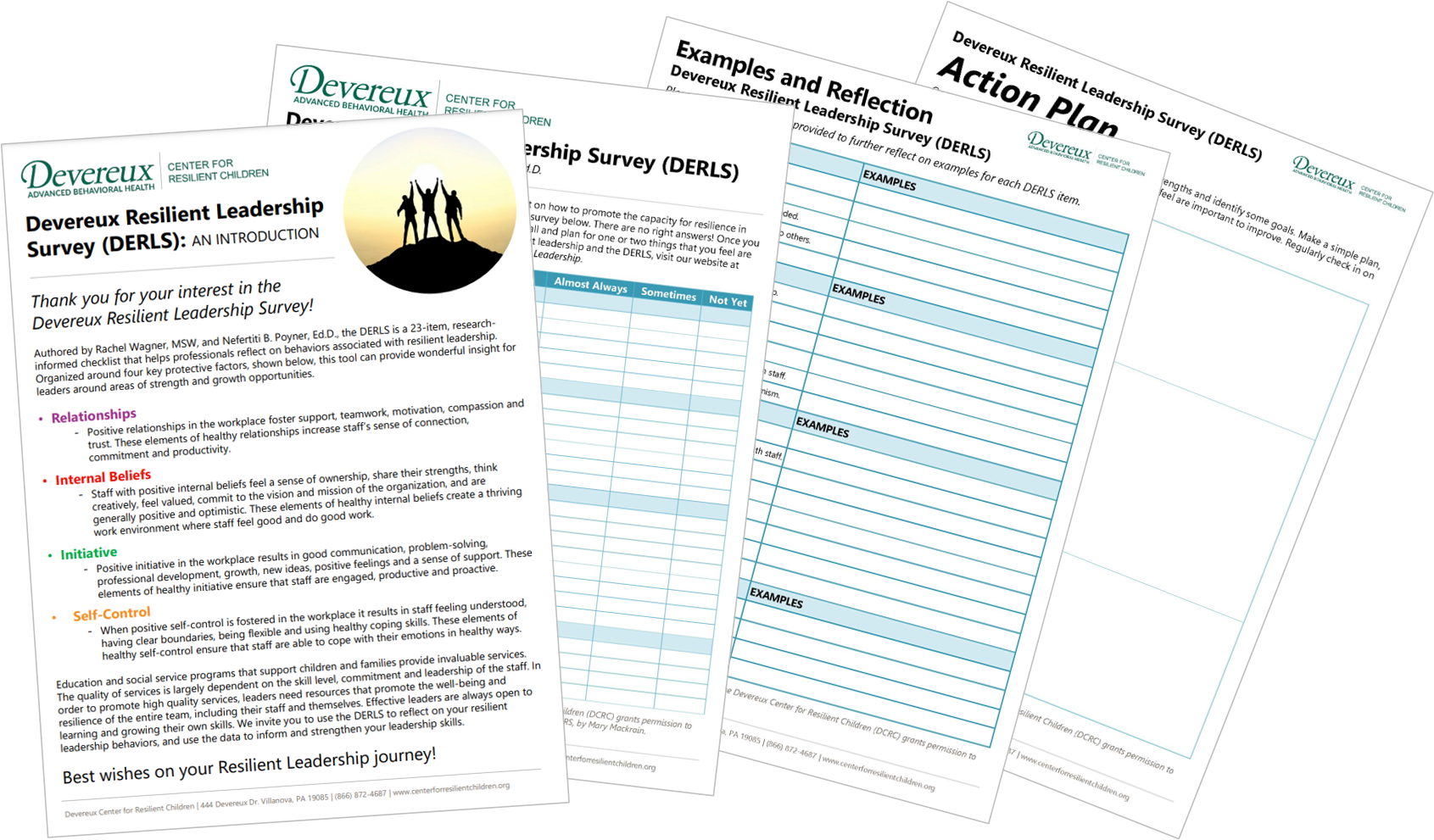Resilient leadership is the term used to describe those leadership behaviors that help others withstand crisis and adapt to or rebound from adversity (Everly, 2012).
Adults who dedicate themselves to caring for young children and managing systems of care and education know this to be true: this effort can be extremely rewarding and also very challenging. Our teams offers support specifically for directors, supervisors, and others in leadership positions.
Devereux Resilient Leadership Survey (DERLS)
Authored by Rachel Wagner, MSW, and Nefertiti B. Poyner, Ed.D., the Devereux Resilient Leadership Survey (DERLS) is a 23-item, research-informed checklist that helps professionals reflect on behaviors associated with resilient leadership. Organized around four key protective factors – Relationships, Internal Beliefs, Initiative and Self-Control – this tool can provide wonderful insight for leaders around areas of strength and growth opportunities.
Relationships
- Positive relationships in the workplace foster support, teamwork, motivation, compassion and trust. These elements of healthy relationships increase staff’s sense of connection, commitment and productivity.
Internal Beliefs
- Staff with positive internal beliefs feel a sense of ownership, share their strengths, think creatively, feel valued, commit to the vision and mission of the organization, and are generally positive and optimistic. These elements of healthy internal beliefs create a thriving work environment where staff feel good and do good work.
Initiative
- Positive initiative in the workplace results in good communication, problem-solving, professional development, growth, new ideas, positive feelings and a sense of support. These elements of healthy initiative ensure that staff are engaged, productive and proactive.
Self-Control
- When positive self-control is fostered in the workplace it results in staff feeling understood, having clear boundaries, being flexible and using healthy coping skills. These elements of healthy self-control ensure that staff are able to cope with their emotions in healthy ways.
Education and social service programs that support children and families provide invaluable services. The quality of services is largely dependent on the skill level, commitment and leadership of the staff. In order to promote high quality services, leaders need resources that promote the well-being and resilience of the entire team, including their staff and themselves. Effective leaders are always open to learning and growing their own skills. We invite you to use the DERLS to reflect on your resilient leadership behaviors, and use the data to inform and strengthen your leadership skills.
Best wishes on your Resilient Leadership journey!
- Download/print a free copy of the Devereux Resilient Leadership Survey (DERLS) in English or Spanish.
- View our webinar focused on the topic of Resilient Leadership.
- Schedule professional development for your staff! Contact Debi Mahler, Director of Professional Development, at [email protected], or fill out our Professional Development Needs Assessment Form.
Resilient Leadership Training Evaluation
The Devereux Center for Resilient Children (DCRC) team often speaks about the importance of the “Resilience Cascade” or the “Resilience Connection.” These notions highlight the point that promoting resilience in children requires that we also pay close attention to our own social and emotional well-being, as well as the overall resilience of our team members and work environments. DCRC was fortunate to partner with Bright Horizons to evaluate how we can best support early childhood programs in fostering cultures of resilience that create a “resilience cascade.” Our partnership began in December of 2017, and we are thrilled to release the outcomes of a randomized control trial of a training model that provides a framework for leaders/supervisors in early childhood education, to reflect upon and implement strategies designed to promote resilient leadership.



